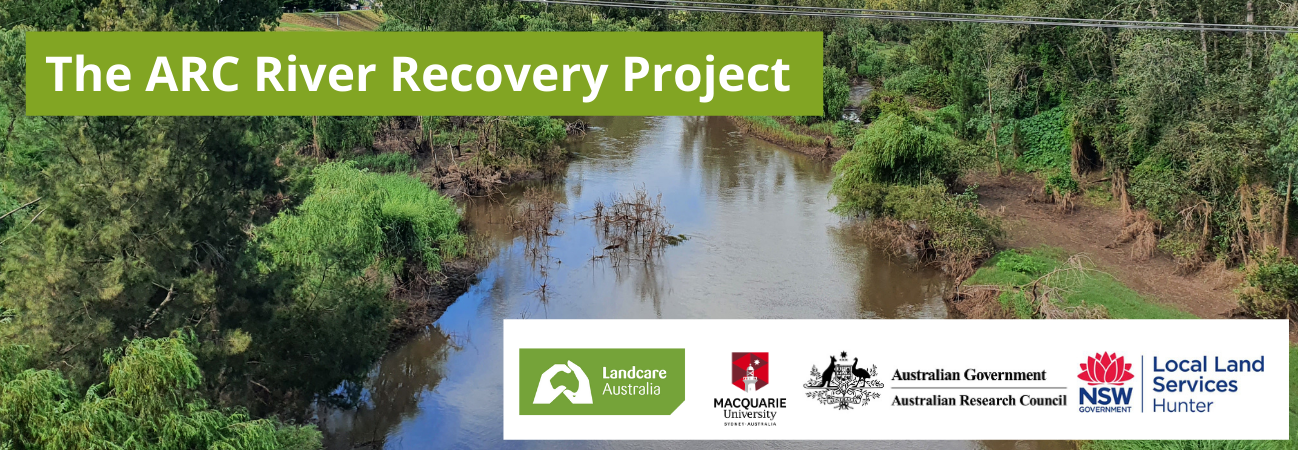
Research partnership supports sustainable river management in New South Wales
The ARC River Recovery Project is a research alliance between Landcare Australia, Hunter Local Land Services and Macquarie University. Landcare Australia contributed funding from the Raymond Borland Bequest to the Australia Research Council (ARC) Linkage Project, aimed at showcasing the river recovery that has been happening in NSW over the last several decades.
The research being undertaken aligns with Landcare Australia’s core values of establishing collaboration and mutually beneficial relationships to improve sustainable land and river management, and Hunter Local Land Services’ strategic plans to support improved decision making and practices.
Outcomes from the project will be used by Landcare Australia and Hunter Local Land Services to support river managers, government and landcare to mitigate, respond and recover from natural disasters while addressing priority knowledge gaps and barriers to improved practice. This collaborative project is providing data and knowledge for ongoing sustainable river management and rehabilitation.
Macquarie University research to date shows that New South Wales coastal rivers are showing signs of both structural and vegetative recovery and improved river health thanks to improved land management practices and the implementation of nature-based solutions. Further research aims to understand the mechanisms of this recovery and develop sustainable management practices that will ensure the continued health of our rivers.
ARC River Recovery Project Summary:
After years of river degradation, there is finally good news as rivers are showing signs of both structural and vegetative recovery. This is thanks to the efforts of various groups, including public agencies, private businesses, landowners, and scientists who have invested heavily in promoting river recovery. The most significant progress has been seen in coastal valleys of NSW, where over half of the 81,000km of stream length now shows signs of recovery. However, the balance remains delicate, as climate change, land use pressures, and other challenges could lead to further degradation if not managed effectively. Therefore, research is needed to understand the mechanisms of recovery and to develop sustainable management practices that will ensure the continued health of our rivers. Using historical records, researchers have tracked the recovery of rivers in parts of Hunter and NSW mid-north coast regions since the mid-20th century. Since the 1980s, improved land management practices and grassroots river rehabilitation has contributed to the accelerated recovery of river structure and habitat, and improvements in vegetation cover. With the increase in hydraulic roughness, the resilience of rivers to flooding has increased. This has implications for flood risk assessment, forecasting, and management in a future where extreme weather events (floods and droughts) are more likely. The cost:benefit of undertaking and maintaining recovery-enhancement in river management is being examined at a broad-scale to determine the economic benefits of working with river recovery to improve river condition. Now that river recovery is happening, this project is improving our understanding of this phenomenon, determining the best management approach to maintaining and enhancing recovery into the future.
ARC River Recovery Project Aims:
Aim 1. What geomorphic recovery are we seeing and why? We will describe and measure what this recovery looks like, how it happens, and predict how likely it is to continue in the future.
Aim 2. What has been the role of vegetative recovery? We will identify and measure the amount of vegetation returning to riparian and instream areas. We will also test new methods for managing the quality of this vegetation.
Aim 3. What effect is this recovery having on flow and flood flow hydrology? We will investigate how geomorphic and vegetative recovery is affecting flood characteristics (e.g. speed and travel times).
Aim 4. What do we do now? What river management options are available to us? How do we communicate the need for a change in philosophy and practice? We will determine where the corridors of river recovery are located, and the cost:benefit of working with recovery. We’ll also work with industry partners to design new engagement and communication outputs.


The Raymond Borland Bequest was made to Landcare Australia by New South Wales businessman, Raymond Borland, who was disturbed by the degradation of the Australian landscape and wanted to support landcare work across New South Wales.



